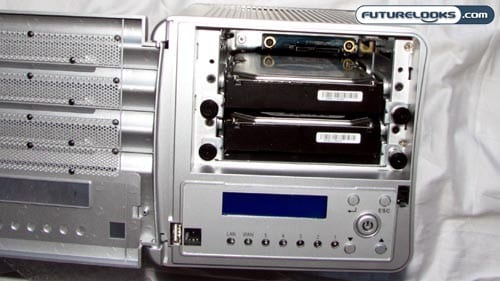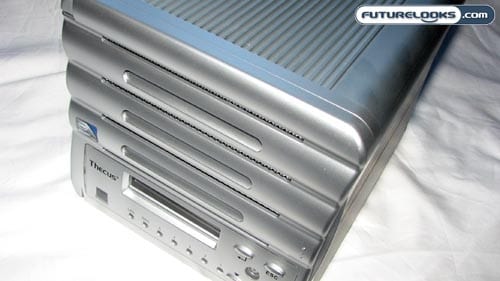Power Consumption and Performance Benchmarks

In terms of power consumption, I used a simple external power meter and found the Thecus N0503 to take about 33 watts with intermittent access. By comparison, the Synology DS409slim had a peak consumption of 23 watts. The difference may be because of the smaller 2.5-inch drives used by the Synology. From a temperature standpoint, the internal temperature sensor on the Thecus wavered between 40 and 50 degrees Celsius, depending on the current load. It’s clear that the fan inside is definitely needed.
For a real world performance test, I tried pushing a folder with 100MB of MP3 audio files over my 802.11g Wi-Fi network to the NAS and this took 179 seconds, representing a transfer rate of 0.55MB/s. The reverse transfer took 290 seconds (0.34MB/s). When my laptop was hardwired to the network, performance improved considerably, completing the same two tasks in 13 seconds (7.69MB/s) and 10 seconds (10.00MB/s), respectively.
Copying a single 288MB video file to the NAS over Wi-Fi took 423 seconds (0.68MB/s). The reverse transfer took 1068 seconds (0.27MB/s). Again, a hardwired connection was much better, taking 36 seconds (8.00MB/s) and 29 seconds (9.93MB/s), respectively.
For a more scientific approach, we once again utilized the Intel NAS Performance Toolkit. The test for copying directories to and from the NAS resulted in average transfer speeds of 4.903MB/s and 6.414MB/s, respectively. The test for copying a large file to and from the NAS yielded average throughputs of 8.456MB/s and 8.610MB/s, respectively.
Interestingly, the real world test seemed to provide better performance numbers for directories, but the Intel benchmark provided better figures for a larger, single file.
Final Thoughts

I had high hopes for the Thecus N0503 ComboNAS, given its purported versatility. It seemed very promising, since you could easily switch between using 2.5-inch or 3.5-inch drives as you saw fit. The range of RAID options (I used RAID5) was a plus too, as were the integrated services for managing downloads and serving media.
I was also quite pleased with the overall design and build quality, giving you a sense that this product meant serious business with its slick aluminum body and silver finish. The server-like door in the front was good, as was the small but useful display. The web-based interface is also a major plus, letting you access many of the features in a few clicks. It’s still rather cumbersome, but it is a vast improvement over previous Thecus outings.
However, actual usage of the NAS left much to be desired. The setup process was not nearly as easy as it could have been, since it was not able to “repair” its own IP address or detect the correct gateway. Even though it used supposedly faster 3.5-inch drives, the Thecus only barely matched the performance of a Synology NAS using 2.5-inch drives.
Selling for about $450 online, the Thecus N0503 isn’t exactly the cheapest option on the block either. At that price point, I expected a bit more polished package.
Pros
- Versatile design for either 2.5″ or 3.5″ drives
- Good physical build quality
- Easy to install and access drives
Cons
- Frustrating setup process
- Slower than expected performance
- Access to extra services not intuitive
- Expensive for overall package received
Overall Rating: 6.5 / 10.0
Love This Review? Hate This Review? Tell Us In The Forums!
